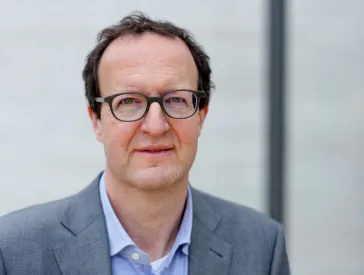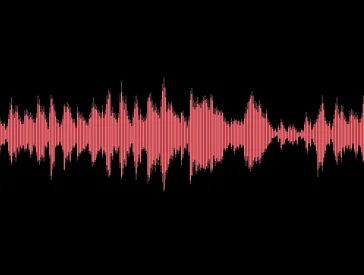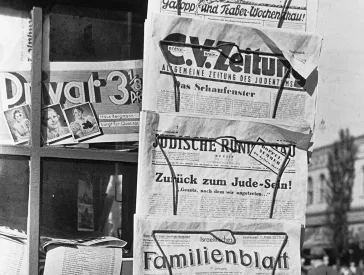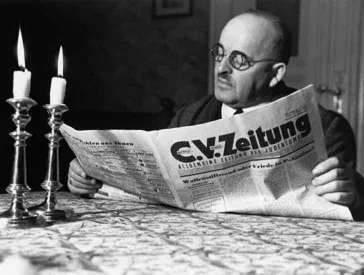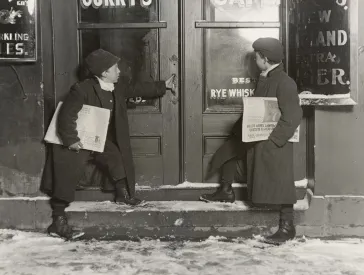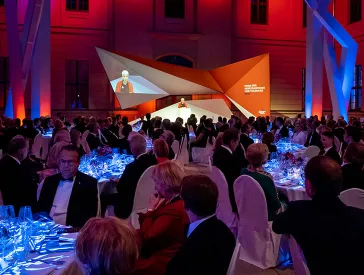This year’s Prize for Understanding and Tolerance
will be awarded to Siemens President and CEO Joe Kaeser and Joachim Gauck, former President of the Federal Republic of Germany
Press Release, Tue 17 Oct 2017
On Saturday, November 11, 2017, the Jewish Museum Berlin will present the Prize for Understanding and Tolerance for the sixteenth time. This year’s prize will go to Joe Kaeser, President and CEO of Siemens AG, and Joachim Gauck, former President of the Federal Republic of Germany.
German Foreign Minister Sigmar Gabriel will give the award presentation speech for Joe Kaeser; and Sir Christopher Clark, historian and Regius Professor of History at the University of Cambridge, will give the speech for Joachim Gauck. Peter Schäfer, director of the Jewish Museum Berlin, will present the awards.
- Contact
-
Press office
T +49 (0)30 259 93 419
presse@jmberlin.de
- Address
Jewish Museum Berlin Foundation
Lindenstraße 9–14
10969 Berlin
The Prize for Understanding and Tolerance
Since 2002 the Prize for Understanding and Tolerance has been awarded to individuals from business, culture, and politics who have rendered outstanding service in the interest of understanding and tolerance. The prize is traditionally presented at a gala anniversary dinner, awarded jointly by the Society of Friends and Sponsors of the Jewish Museum Berlin Foundation and the Museum.
Award Winner 2017: Joe Kaeser
Joe Kaeser was born in Arnbruck, Germany, in 1957. After completing secondary school, he studied business administration in Regensburg. In 1980, he began his career at Siemens in Regensburg in the field of components and semiconductors. Later, he worked for the company in Malaysia and the United States. In 1999, Kaeser moved from Silicon Valley to Siemens headquarters in Munich, where he held various positions – from Chief Strategy Officer to Chief Financial Officer. Since 2013, he has been President and Chief Executive Officer of Siemens AG, which employs 370,000 people worldwide.
In keeping with the spirit of company founder Werner von Siemens, Kaeser believes that business leaders must act responsibly and make sure the companies they lead contribute to the welfare and advancement of society in a sustainable way. He calls this principle “business to society,” and advocates activities at Siemens that benefit society. In fiscal year 2016, Siemens donated a total of 23 million € for education, research, culture, and social projects. In addition, the corporation trains young people worldwide to help them acquire the skills needed in the digital age.
In its decision to confer the Prize for Understanding and Tolerance to Joe Kaeser, the jury acknowledged his “efforts to encourage tolerance, respect, and diversity at Siemens, values which he also promotes in his private life. For him, ensuring this high level of authenticity is vital.” The jury noted that he personally supports nonprofit projects for young people and is a strong advocate of social integration initiatives in disadvantaged areas.
Kaeser has maintained close ties to the Jewish Museum Berlin for many years. He is part of a generation of Germans whose knowledge of World War II and the Holocaust comes from history books and from the stories of those who experienced that period. Nevertheless, he is convinced that this generation and future generations have a special responsibility to be keenly aware of this history and to promote the ideals of a peaceful and free society. Siemens AG is a corporate member of the Society of Friends and Sponsors of the Jewish Museum Berlin Foundation. Since 2012, the company has supported the Jewish-Islamic Forum as part of the W. Michael Blumenthal Academy programs.
Award Winner 2017: Joachim Gauck
Joachim Gauck was born in Rostock, Germany, in 1940. After completing secondary school he studied theology there. From 1965 to 1990 he was in the service of the Lutheran Church of Mecklenburg, working for many years as a pastor. As one of the initiators of the church and public resistance to the dictatorship of the Socialist Unity Party (SED, East Germany’s state party), Gauck co-founded the New Forum opposition movement in 1989 and was the group’s spokesperson in Rostock. He invited people to participate in the weekly prayers for peace, the precursor to the weekly demonstrations that led to the peaceful revolution in East Germany.
In March 1990 Gauck became a member of the first freely elected East German parliament (Volkskammer) for the Bündnis 90 (Alliance 90), which was an alliance of New Forum and other grassroots movements. On October 3, 1990, German Unification Day, German Federal President Richard von Weizsäcker appointed him the Special Commissioner of the Federal Government for the former State Security Service (Stasi) files pertaining to individuals. As the first Federal Commissioner for the Files of the State Security Service of the former German Democratic Republic, from 1991 to 2000, Gauck was the director of the agency that to today is responsible for preserving the Stasi files and making them accessible to the public.
From 2001 to 2004 Gauck was on the management board of the European Monitoring Center on Racism and Xenophobia (later called the European Union Agency for Fundamental Rights) in Vienna. From 2003 to 2012 he was the federal chair of Gegen Vergessen – Für Demokratie (Against Forgetting – For Democracy), which actively deals with Nazism and the SED dictatorship, and since 2017 its honorary chair.
On March 18, 2012, the Federal Convention elected Gauck the eleventh President of the Federal Republic of Germany. His term ended on March 18, 2017.
Joachim Gauck’s guiding principle is that “for those who have reached adulthood, freedom means responsibility”; with this, he encourages people living in Germany to play an active role in shaping their lives as citizens. When W. Michael Blumenthal received the 2015 Prize for Understanding and Tolerance, the German president gave the award presentation speech. Only one day earlier, a series of terrorist attacks had shaken Paris. “Understanding and tolerance,” said Gauck in his speech, “On days like today, we can see just how precious those values are, and how important it is to staunchly defend them from the enemies of freedom and extremists of all kinds.”
In its decision to award the 2017 Prize for Understanding and Tolerance to Joachim Gauck, the jury wrote: “All your public work has stood under this premise. In view of the state of global political affairs, it is all the more important that people like you succeed in encouraging every single one of us to accept responsibility for a peaceful and liberal-minded Europe. Regarding the premise that a common future must be shaped by everyone, you are a model, setting an example for all of us.”
Past recipients of the Prize, 2002–2016
Past recipients of the Jewish Museum Berlin Prize for Understanding and Tolerance: Berthold Beitz, Chairman of the Curatorium of the Alfried Krupp von Bohlen and Halbach Foundation, and Heinrich von Pierer, former Chairman of the Siemens AG Board (2002), former Federal Minister for Internal Affairs Otto Schily and publisher Friede Springer (2003), the entrepren€ Michael Otto and former Federal President Johannes Rau (2004), the art collector and patron Heinz Berggruen and the politician Otto Graf Lambsdorff (2005), Daniel Barenboim, General Music Director of the Berlin State Opera, and the BMW manager Helmut Panke (2006), former Federal Chancellor Helmut Kohl and the historian Fritz Stern (2007), the corporate consultant Roland Berger and the Hungarian Nobel Laureate in Literature Imre Kertész (2008), Franz Fehrenbach, Chairman of the Board of the Robert Bosch GmbH, and Christof Bosch, spokesperson for the family and member of the Supervisory Board of the Robert Bosch Foundation GmbH – both as representatives of the Bosch Group – and the film director Michael Verhoeven (2009), literary scholar Jan Philipp Reemtsma and the business executive Hubertus Erlen (2010), Federal Chancellor Angela Merkel (2011), Klaus Mangold, chairman of the Supervisory Board of Rothschild GmbH (Frankfurt and Moscow), and former Federal President Richard von Weizsäcker (2012), Berthold Leibinger, Trumpf GmbH, and actress Iris Berben (2013), publisher Hubert Burda and German Minister of Finance Wolfgang Schäuble (2014), W. Michael Blumenthal, founding director of the Jewish Museum Berlin (2015), and last year historical eyewitnesses Renate Lasker-Harpprecht and Anita Lasker-Wallfisch, and the businessman Hasso Plattner.
The press invitation with additional details regarding accreditation and the schedule of the evening’s events will be available shortly.
